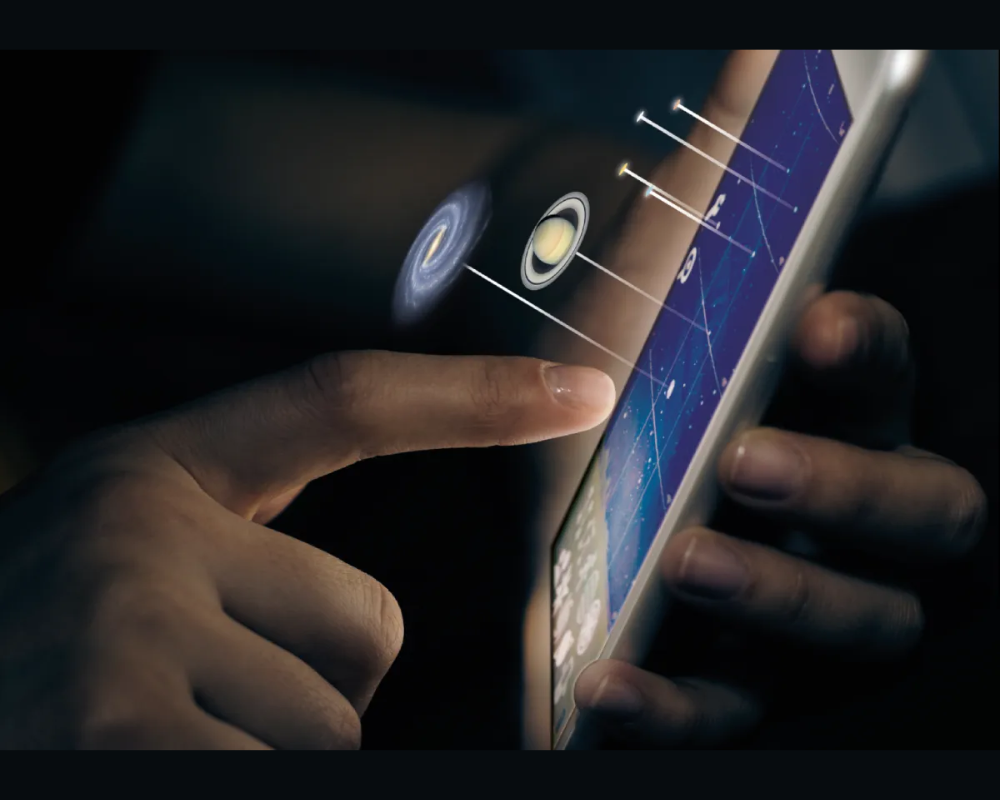Discover the Universe at Your Fingertips
The Free Astronomy Apps to Explore Space are revolutionizing how we connect with the cosmos.
🌌 With technological advancements, anyone can explore stars, planets, and constellations directly from their smartphone.
This makes astronomy more accessible, fascinating, and interactive for everyone.
📚 The Role of Technology in Education and Cosmic Knowledge
Today, technology is transforming how we learn and access information.
Astronomy apps not only facilitate learning but also spark curiosity about the universe.
They allow users to combine scientific data with visual and hands-on experiences.
Why is this important?
- 🌟 Encourages STEM learning: Astronomy is an entry point to science, technology, engineering, and mathematics.
- 🎓 Accessible education: These apps democratize knowledge, making it available to all ages and skill levels.
- 🔍 Visual engagement: Through simulations and augmented reality, learning becomes more immersive.
💡 Tip: Use these apps to complement school studies or create unique family learning moments.
🌌 How Space Exploration is Changing with Apps
Exploring the universe used to require expensive telescopes and technical knowledge.
Today, a smartphone is all you need to observe and learn about the night sky.
The Free Astronomy Apps to Explore Space make this experience practical and enjoyable.
Key advancements enabled by apps:
- 🔭 Augmented reality: Identify constellations and planets in real-time, merging the digital world with your surroundings.
- 🌠 Interactive simulations: Virtually travel through the solar system and explore distant galaxies.
- 📡 Real-time information: Receive alerts about meteor showers, eclipses, and other astronomical events.
👉 Fun fact: Many apps also provide historical data and updates on space missions, connecting the past and future of cosmic exploration.
🌟 Benefits of Free Astronomy Apps to Explore Space
Here are some reasons why you should try these apps:
- 📍 Easy access: Point your device at the sky and instantly identify constellations and planets.
- 📚 Interactive learning: Combine star maps, fun facts, and simulations to enhance your knowledge.
- 💰 Economical: No need to spend on expensive equipment to explore the cosmos.
- 🌐 Community connection: Join forums and share your discoveries with other enthusiasts.
- 📅 Practical planning: Organize your observations and never miss important astronomical events.
🧑🚀 Question: What would you most like to explore in the night sky? A specific constellation or a rare phenomenon?
🔭 Why Choose Astronomy Apps?
The Free Astronomy Apps to Explore Space offer features that go beyond simple stargazing. Here’s how they enhance your experience:
1. Simple and Immediate Access
With just a few taps, you can identify stars and constellations while learning more about them.
2. Educational Tools
Many apps include sections dedicated to curiosities, mythology, and detailed information about celestial bodies.
3. Advanced Features
Apps like Stellarium and SkySafari allow you to plan future observations and even control telescopes remotely.
💡 Suggestion: Try different apps to find the one that best meets your expectations, whether for simplicity or in-depth features.
🚀 Get Ready to Explore the Universe
Now that you understand how these apps can transform your experience, it’s time to choose one.
In this article, we’ll present 10 of the best Free Astronomy Apps to Explore Space, detailing their features, advantages, and disadvantages.
What can you expect?
- 🔎 App details: Discover the most useful features of each tool.
- 📋 Comparisons: See how they stand out in usability and functionality.
- 🌌 Personalized choice: Learn which app suits your level of knowledge and curiosity.
📣 We Invite You to Explore!
The Free Astronomy Apps to Explore Space are here to connect you to the cosmos. Which one will be your guide to the universe? Keep reading and find out! 🌟
1. Star Walk 2
Star Walk 2 is one of the most popular apps for identifying stars and constellations.
Key Features:
- Real-time star map: Point your device at the sky to discover what’s above.
- Augmented reality: Combine the real world with interactive star maps.
- Detailed information: Learn more about celestial objects with a single tap.
- Astronomical events: Receive alerts about meteor showers and eclipses.
- Night mode: Use the app without compromising your night vision.
- User-friendly interface: Easy to navigate, even for beginners.
⭐ User Opinion:
“Simply fascinating! Perfect for stargazing nights.”
❓ What was the last constellation you identified?
2. SkySafari
SkySafari is ideal for those seeking an advanced app for observation and learning.
Key Features:
- Planet simulation: Virtually travel through the solar system.
- Telescope control: Connect the app to your telescope for a complete experience.
- Astronomical encyclopedia: Discover curious facts about the universe.
- Orbital predictions: See where planets will be on specific dates.
- Detailed graphics: Visualize constellations and galaxies in high definition.
- Active community: Join forums and share your discoveries.
✅ Advantage: Advanced features even in the free version.
❌ Disadvantage: Interface can be complex for beginners.
🚀 Tip: Use the prediction feature to plan your next observation!
3. Stellarium Mobile
Stellarium Mobile turns your phone into a portable planetarium.
Key Features:
- High-resolution maps: View stars and constellations in stunning detail.
- Expanded catalog: Access data on over 600,000 stars.
- Custom settings: Adjust the horizon and light pollution.
- Featured events: Stay updated on eclipses and planetary conjunctions.
- Offline mode: Explore space even without internet access.
- Ease of use: Excellent for learning astronomy.
⭐ User Opinion:
“The best app for beginners in astronomy.”
4. NASA App
The official NASA App is packed with incredible content about space exploration.
Key Features:
- Live broadcasts: Watch space events in real-time.
- Image gallery: Explore stunning photos from deep space.
- News and updates: Follow space missions and discoveries.
- Scientific data: Access reports and detailed NASA information.
- Interactive exploration: Learn more about planets, moons, and solar systems.
- Educational resources: Perfect for students and teachers.
✅ Advantage: Reliable content directly from NASA.
❌ Disadvantage: Not focused on direct sky observation.
❓ What NASA image impressed you the most?
5. SkyView
SkyView combines learning and fun, making it perfect for all ages.
Key Features:
- Instant location: Find stars, planets, and satellites within seconds.
- AR compatibility: Use augmented reality to explore the sky.
- ISS tracking: Follow the International Space Station’s movements.
- Daily events: Discover what’s happening in the sky today.
- Astronomical facts: Learn fascinating stories about constellations.
- Intuitive design: Easy to navigate for a seamless experience.
⭐ User Opinion:
“A great introduction to the world of astronomy.”
6. Night Sky
Night Sky offers a visually stunning experience for sky exploration.
Key Features:
- Interactive guide: Quickly find stars and constellations.
- AR experience: See the night sky integrated with your surroundings.
- Learning mode: Dive into the history of celestial objects.
- 3D visualizations: Explore galaxies with breathtaking 3D images.
- Apple Watch compatibility: Get notifications right on your wrist.
- Astronomical alerts: Never miss an important event.
✅ Advantage: High-quality visuals.
❌ Disadvantage: Some features are exclusive to the paid version.
7. Star Chart
Star Chart is an impressive app that uses augmented reality to turn your device into a personal planetarium.
Key Features:
- Augmented reality: Point your device at the sky to learn about stars and planets.
- Mythological stories: Explore the tales and legends behind constellations.
- Accurate tracking: Identify celestial objects with precision anywhere on Earth.
- Night mode: Protect your vision while stargazing.
- Event predictions: Know when and where to see astronomical phenomena.
- Offline functionality: Perfect for remote areas without internet access.
✅ Advantage: Great balance between simplicity and detailed information.
❌ Disadvantage: Some customization options require payment.
⭐ User Opinion:
“Perfect for trips to the countryside and stargazing nights.”
8. ISS Tracker
If following the International Space Station is your goal, ISS Tracker is the perfect choice.
Key Features:
- Real-time tracking: See the ISS’s current location on the map.
- Passage notifications: Get alerts when the ISS is visible in your area.
- Live visuals: Watch real-time broadcasts from the ISS.
- Detailed information: Learn about the mission and astronauts aboard.
- Orbital predictions: Plan observations based on ISS routes.
- Educational mode: Discover fun facts about the ISS and space missions.
✅ Advantage: Immersive experience for space enthusiasts.
❌ Disadvantage: Focus is limited to the ISS.
⭐ User Opinion:
“Impressive for following the station and planning observations.”
9. Cosmos Browser
Cosmos Browser is an interactive encyclopedia for those who want to deeply learn about the universe.
Key Features:
- Cosmos exploration: Access information on stars, galaxies, and nebulae.
- Interactive graphics: Navigate through 3D maps of the universe.
- Educational mode: Perfect for learning astronomy in a fun way.
- Updated content: Discover the latest scientific discoveries.
- Science-focused: Explore data and theories in an accessible format.
- Multimedia library: Enjoy videos, photos, and captivating animations.
✅ Advantage: Rich in information and visually engaging.
❌ Disadvantage: Does not include real-time tracking.
⭐ User Opinion:
“A great resource for those who want to learn about astronomy in depth.”
10. Heavens-Above
Heavens-Above is a comprehensive app for tracking satellites, planets, and astronomical events.
Key Features:
- Satellite tracking: Locate satellites like Hubble and the ISS.
- Astronomical calendar: Plan observations for upcoming events.
- Sky map: Identify visible celestial objects at the moment.
- Custom mode: Adjust settings according to your location.
- Accurate predictions: Know exactly when and where to observe.
- Technical interface: Ideal for more experienced astronomers.
✅ Advantage: Excellent for detailed planning.
❌ Disadvantage: Interface can be complex for beginners.
⭐ User Opinion:
“Perfect for tracking satellites and exploring astronomical phenomena.”
Comparison Table
| App | Advantages | Disadvantages | Recommended For | Overall Rating |
|---|---|---|---|---|
| Star Walk 2 | ✅ Easy to use ✅ Night mode | ❌ Advanced features require payment | Beginners and enthusiasts. | ⭐⭐⭐⭐⭐ |
| SkySafari | ✅ Advanced features ✅ Telescope control | ❌ Complex interface for beginners | Amateur and experienced astronomers. | ⭐⭐⭐⭐ |
| Stellarium | ✅ Simple ✅ Offline mode | ❌ Limited free version | Newbies and curious learners. | ⭐⭐⭐⭐ |
| NASA App | ✅ Educational content ✅ Space news | ❌ Not focused on direct sky observation | Students and NASA fans. | ⭐⭐⭐⭐⭐ |
| SkyView | ✅ Fun ✅ Augmented reality | ❌ Some features require payment | Families and casual explorers. | ⭐⭐⭐⭐⭐ |
| Night Sky | ✅ Stunning visuals ✅ Useful notifications | ❌ Limited free features | iOS users and sky photographers. | ⭐⭐⭐⭐ |
| Star Chart | ✅ Stellar mythology ✅ Offline functionality | ❌ Extra features require payment | Sky explorers on trips. | ⭐⭐⭐⭐⭐ |
| ISS Tracker | ✅ Real-time tracking ✅ Live broadcasts | ❌ Focus limited to the ISS | Space mission enthusiasts. | ⭐⭐⭐⭐ |
| Cosmos Browser | ✅ Educational ✅ Interactive multimedia | ❌ No real-time tracking | Students and curious minds. | ⭐⭐⭐⭐⭐ |
| Heavens-Above | ✅ Detailed planning ✅ Satellite tracking | ❌ Complex for beginners | Technical astronomers and enthusiasts. | ⭐⭐⭐⭐ |
Expanded Conclusion: A Universe of Possibilities
The Free Astronomy Apps to Explore Space bring the universe to your fingertips, enabling anyone, regardless of knowledge level, to connect with the cosmos.
Each app offers unique features, catering to everyone from curious beginners to amateur astronomers eager to explore the night sky.
📊 Insights from the Comparison Table
Looking at the comparison table, it’s clear that each app has strengths and weaknesses, making the choice a matter of personal preference and needs.
- 🌟 Simplicity and Fun: For something easy and visually appealing, SkyView and Star Walk 2 are perfect. Both are intuitive and ideal for families or beginners wanting a relaxed exploration of the sky.
- 🔭 Advanced Features: For those looking to plan technical observations, Heavens-Above and SkySafari offer detailed tools like satellite tracking and astronomical predictions. These apps are better suited for users with prior knowledge.
- 📚 Education and Science: NASA App and Cosmos Browser stand out as educational options. They’re perfect for anyone who wants to learn about the universe theoretically, follow space missions, and explore scientifically rich content.
🌌 Choosing the Best for Your Journey
Whether you’re a beginner gazing at the sky for the first time or an experienced observer planning astronomical events, there’s an app for you. Use the comparison table as a guide to evaluate:
- Which features are essential for you?
- Which app matches your experience level?
- Do you prefer practical tools or theoretical learning?
Remember, the best app is the one that complements your curiosity and meets your expectations in a practical way.
📣 An Invitation to Explore
Now that you’re familiar with the Free Astronomy Apps to Explore Space, the adventure is within reach!
🚀 Download now on the Google Play Store or App Store and start unlocking the secrets of the universe.
Try different apps and find the one that becomes your favorite cosmic guide.
🧑🚀 Question: Which constellation or astronomical phenomenon do you want to explore first?
📣 Share: Have you used any of these apps?
Leave a comment with your experience.
Your feedback might inspire other space enthusiasts! 🌌





